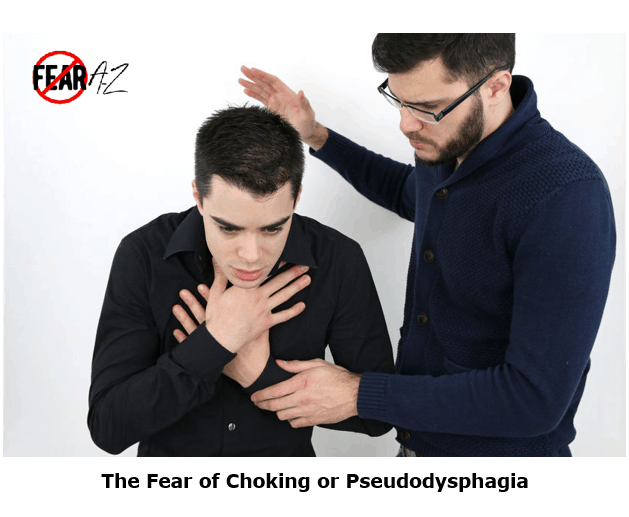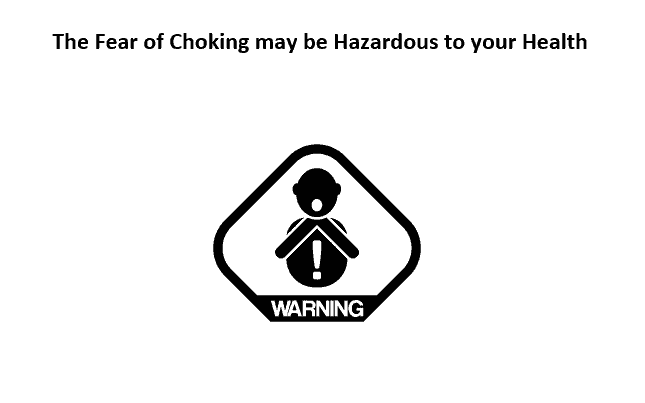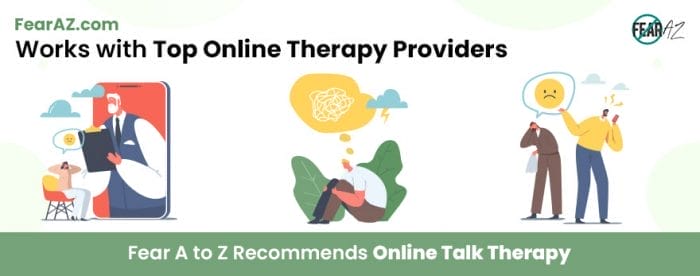Share This Article
The Excessive Fear of Choking
Do you feel nervous while eating because you fear you might choke?
Do you only eat soft foods because you’re afraid solids might get caught in your windpipe?
Are you skipping meals and losing weight because you’re scared to eat?
If so, you may suffer from the excessive fear of choking.
The fear of choking is somewhat normal when eating. However, if you are not eating at all or the fear is causing other health problems, you may need to seek help. The first step is to learn about the fear. Just understanding it will help you live a more happy and healthy life enjoying an array of delicious foods.
What Is the Fear of Choking?
The fear of choking is also known as pseudodysphagia or sitophobia. The names come from the Greek words phagein, meaning “eating,” sito meaning “food,” and phobos meaning “fear.” The fear of choking can cause a person to fear swallowing.

The fear itself is an irrational or unnatural fear that one will choke, die, or become ill when trying to eat solid foods. The severity of the fear can be in the form of only being able to eat small pieces of food with a liquid, only drinking liquids, or the inability to swallow medication. With this phobia, the person can have a large loss of weight or the reduction of needed vitamins and minerals, which may lead to devastating conditions that interfere in their daily lives.
The fear of choking is a rare disorder that is more commonly found in females as young as five and up to age 78.
What Causes the Fear of Choking?
In most cases, phobias can be linked to an experience in childhood. Pseudodysphagia can be caused by a reaction that occurred during an earlier time when swallowing food caused a person to choke, gag, or even possibly exhibit an embarrassing facial reaction that caused embarrassment. Once the reaction started, the brain automatically went into defense mode. Therefore, when eating or swallowing, the brain may react in the same manner, which would be to close off the esophagus, so the food cannot be swallowed.
Some research on the other hand associates the fear of choking with high anxiety or other psychiatric disorders such as agoraphobia or depression. The reason these disorders could be the cause is that tension and anxiety can cause the feeling of a lump in the throat due to the constricting throat muscles. When you become very anxious you may not be able to swallow at all, which brings on more fear.
Symptoms of Pseudodysphagia
There are both physical and psychological pseudodysphagia symptoms.
Physical Symptoms Include:
- Avoiding hard or chewy food
- Avoiding swallowing pills or tablets
- Unusual tongue movement
- Feeling pressure in the throat
- Dizziness
- Difficulty breathing
- Fast heart rate
- Will not eat in front of others
Psychological Symptoms of the Fear of Choking:
- Thoughts of dying
- Thoughts of embarrassment
- Nightmares of choking on different types of food
- Anxiety
- Fear of fainting
- Panic attacks
Treatments for Pseudodysphagia
Self-help: What Can I Do To Help Myself with Pseudodysphagia?
Pseudodysphagia treatments can be manageable according to the severity of your fear of choking. For instance, chew foods properly. Every bite of food can be chewed into little pieces and then swallowed with a liquid.
If your fear is severe, you can eat such foods as purees, baby food, and use such appliances as food processors to create healthy foods that are easily swallowed. The main idea is to ensure you are maintaining your proper weight and getting the nutrition your body needs to stay healthy.
Learn coping strategies. When you sit down to eat, stay calm. Anxiety, stress, or tension can trigger the choking feeling.
Meditation can also help by reducing anxiety and stress, which may also trigger the choking sensation. Watching television or listening to music has also been helpful for some individuals with pseudodysphagia. It helps them stay calm and enjoy a meal without added intensity when swallowing.

Professional Help Options
If your fear of choking is interfering with your life, such as excessive weight loss which may be causing other health problems, you may wish to seek professional help.
Professional help is available in the way of cognitive behavioral therapy and hypnotherapy.
Cognitive behavioral therapy is often offered for individuals with anxiety or depression disorders. The main goal of this type of therapy for pseudodysphagia is to learn to cope with the fear and the irrationality of the fear. Once you can analyze the fear, you will learn what tools will help you cope with the thoughts that bring on the feeling of choking. This in turn will reduce symptoms.
Hypnotherapy has also proven to be successful, especially in the case of adolescents that have lost a tremendous amount of weight. One 13-year-old girl received hypnosis sessions, began gaining weight, and was no longer fearful of swallowing.
Medications Used for Pseudodysphagia – Fear of Choking
According to the severity of your symptoms, your therapist may prescribe medications. Medications will not relieve you of the fear of choking but can provide some relief for the symptoms.
Anti-anxiety meds such as Xanax or Valium are prescribed if the fear of choking is bringing on panic attacks. In the majority of cases, the medication is taken on an as-needed basis or three times per day.
If you have depression along with pseudodysphagia, your therapist may prescribe antidepressants. Some patients with both anxiety and depression have success with such medications as Paxil, Lexapro, and Zoloft.
How to Avoid a Fear of Choking
As parents, we can help our children avoid developing the fear of choking by cutting up their food into small pieces. This will help ensure no choking incidents occur in their youth.
Childproofing your home is another way to minimize a child’s risk of a choking incident. Eliminating small objects which could be swallowed and caught in the windpipe will go a long way to avoiding a fear of choking in children.
Another key practice to eliminating possible choking incidents is to allow small children to only play with toys that are age appropriate. Toys with small parts may find their way into a child’s mouth and then be swallowed.
As an adult, to avoid the fear of choking, never talk with your mouth full.
To avoid choking, chew your food properly and never rush when eating.
Working through the Fear of Choking
If you are trying to overcome your fear of choking without therapy, you’ll need to remember that eating is essential to a healthy life. If you’re not progressing and begin losing weight, then you need to seek professional help. Other health issues can arise, such as restrictive food intake disorder, if you allow the fear of choking to control your life.
If you feel like you are having issues swallowing, it would be in your best interest to speak with your physician. The problem could be a physiological one, rather than pseudodysphagia. Once a physiological problem is ruled out, then you can learn ways to cope with your anxiety regarding the fear of choking. You can learn to enjoy eating again when you come to understand that the fear is irrational.



